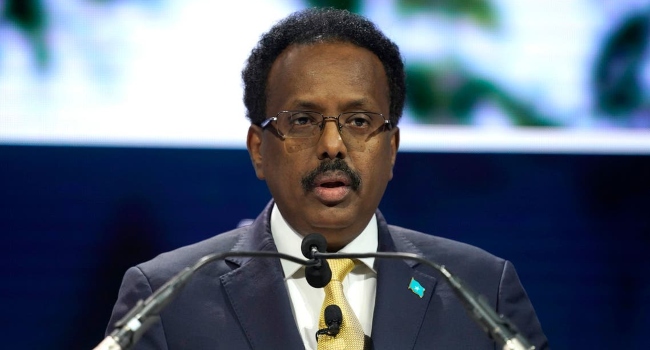Somalia’s President Mohamed Calls For Elections In Bid To Ease Tensions

![]()
Somalia’s President Mohamed Abdullahi Mohamed called early Wednesday for elections and a return to dialogue after the extension of his mandate by two years sparked the country’s worst political violence in years.
The president, best known by his nickname Farmajo, addressed the nation at around 1:00 am local time (2200 GMT) after hours of anticipation, with Mogadishu on a knife’s edge as government troops and pro-opposition soldiers beefed up their positions and civilians fled their homes.
The rival sides exchanged gunfire on Sunday in an eruption of long-simmering tensions sparked by the delay of February elections and Farmajo’s extension of his mandate earlier this month.
The president said he would appear before parliament on Saturday to “gain their endorsement for the electoral process”, calling on political actors to hold “urgent discussions” on how to conduct the vote.
“As we have repeatedly stated, we have always been ready to implement timely and peaceful elections in the country,” he said.
Tensions have been rising in Somalia since Farmajo’s four-year term lapsed in February, as he and leaders of Puntland and Jubaland, two of Somalia’s five semi-autonomous states, failed to agree on how to conduct elections.
A deal had been cobbled together in September, which later collapsed, and multiple rounds of UN-backed talks failed to broker a way forward.
The international community has repeatedly called for elections to go ahead, threatening sanctions.
“I hereby call upon all of the signatories of the 17 September agreement to come together immediately for urgent discussions on the unconditional implementation of the above-mentioned agreement,” said Farmajo.
That agreement paved the way for indirect elections whereby special delegates chosen by Somalia’s myriad clan elders pick lawmakers, who in turn choose the president.
However, the law extending Farmajo’s mandate planned for a long-promised one-person, one-vote election in 2023, the first such direct poll since 1969, the year dictator Siad Barre led a coup before ruling for two decades.
On the ‘precipice’
The collapse of Barre’s military regime in 1991 led to decades of civil war and lawlessness fuelled by clan conflicts.
For more than a decade conflict has centred on Al-Shabaab, the Islamist insurgents linked to Al-Qaeda, who control swathes of countryside and regularly stage deadly attacks in the capital.
However the return of street combat in Mogadishu, and the army splintering along clan lines — the building blocks of Somali society — has put the country on a “precipice”, said analyst Omar Mahmood.
“When we’re talking about the breakdown of security forces along clan lines it really is reminiscent of the civil war that began in the late 80s and early 90s in Somalia,” he said.
Farmajo’s speech came after his Prime Minister Mohamed Hussein Roble — and leaders of the two key states which have backed him, Galmudug and Hirshabelle — on Tuesday rejected the extension of his mandate and called for elections to be held.
The International Crisis Group (ICG) said in a statement that the “immediate trigger” for Sunday’s violence was the influx of army units loyal to one of the opposition presidential candidates, who had abandoned their posts in south-central Hirshabelle — one of the frontlines against Al-Shabaab.
These troops, who have barricaded roads and deployed trucks mounted with machine guns, were now “in control of sections of the capital”, said the ICG.
The UN Mission in Somalia said it was “alarmed” by clan divisions within the Somali National Army and warned the political conflict distracted from the fight against Al-Shabaab.
‘Fear for our lives’
Since the fighting on Sunday, both sides have built up their presence in the capital, terrifying citizens weary of decades of civil conflict and an Islamist insurgency.
Mogadishu residents on Tuesday piled televisions and mattresses into rickshaws or loaded belongings onto donkeys, as they fled their homes.
“We fear for our lives… We have decided to get out of here before it is too late,” said Shamis Ahmed, a mother of five who abandoned her home.
-AFP


